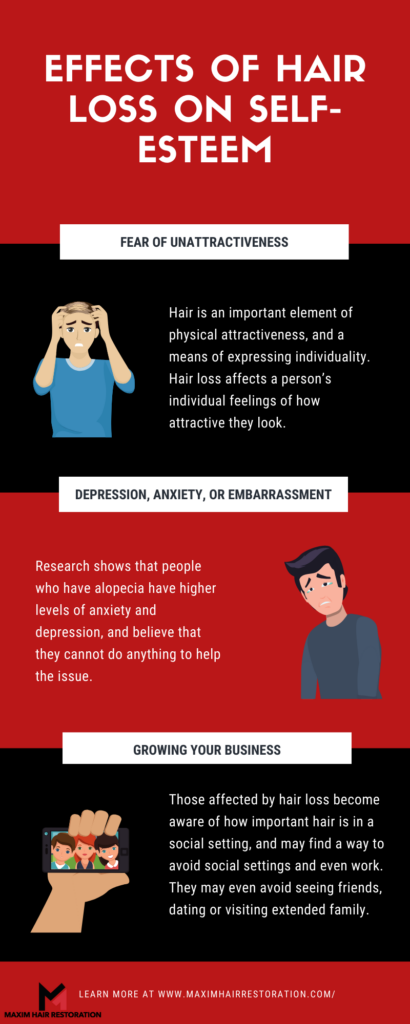The Effects Of Hair Loss On Your Self Esteem
For those with alopecia, a condition resulting in hair loss/baldness, self-esteem plays a huge role. People who experience hair loss, whether a man or woman, usually have a lower self-esteem, as the emotional aspects of losing hair or living with hair loss can be challenging and hard to cope with.
“Ugly is a field without grass, a plant without leaves, or a head without hair.” – Ovid, The Silent Woman
For many people who become bald or experience hair loss, this quote rings true, as this is how they feel about themselves. Self-esteem is defined as a person’s overall subjective emotional evaluation of their own worth. In other words, self-esteem is what we believe about ourselves, accompanied by an emotional state such as pride or shame. Self-esteem can be high or low, depending on various factors physiologically and psychologically.
Effects Of Hair Loss On Your Self Esteem

Nobody wants to lose their hair. The discovery of hair loss is in fact a stressful experience for both men and women, but considerably more distressing for a woman. Throughout the course of history, evidence has shown, that attitudes towards baldness and hair loss have been overwhelmingly negative. Therefore, living with a condition such as alopecia can be difficult in a culture where they view hair as a symbol of youthfulness and good health.
Hair loss affects more than 50 million Americans, with 20 percent of them being women. Everyone loses their hair, it happens while taking a shower, when you brush it, and even when you play with it. You look down at your brush, and see it all right there. On average, a person’s scalp has approximately 100,000 hair follicles. This is where the strand of hair grows out of, and these follicles are located just below the skin’s surface. It is normal that on average, a person will lose fifty to one hundred hairs a day.
Hair loss can be temporary, but in many unfortunate cases it can be permanent. Whether your hair loss is temporary or permanent depends on a variety of factors, such as genetics, hormone levels, overall health, nutrition, and natural aging. Hair loss can also be due to certain medications (like birth control), hormone imbalances, chemotherapy, stress, skin problems, and other reasons. Many aspects of our lifestyle from what we eat to how we treat our hair affect the strength of hair fibers.
According to the American Academy of Dermatology, genetic hair loss (known as androgenetic alopecia) is the most common cause of hair loss. The gene can be inherited from either your mother or father’s side of the family, though you’re more likely to have it if both of your parents had hair loss.
Indeed, genetics plays a very big role in hair loss, and close to that are the basics such as good health, balanced diet, hair maintenance, and hormone levels. It is true that most people have slower hair growth as they age, due to the body’s overall growth and rejuvenation slowing down. In fact, some men with a family history of hair loss, can start losing their hair before they are 21, and start balding by 25 years of age.
Hair loss can result in the following:
1. Loss of personal attractiveness and fear of not looking attractive to other people
Hair is an important element of physical attractiveness, and a means of expressing individuality. Hair loss affects a person’s individual feelings of how attractive they look. For women, it is especially hard to live in a society that places youthful appearance and attractiveness on a high pedestal. Women are known for spending a lot of time and money grooming, dyeing, and styling their hair to make it look its best. So, when they begin to lose their hair, it is extremely traumatic, and all confidence is lost.
2. Feelings of depression, anxiety, and embarrassment
Hair loss often results in depression and anxiety. In a world or place where people are obsessed with always looking their best, and caring what other people think is the norm, research shows that people who have alopecia have higher levels of anxiety and depression, and believe that they cannot do anything to help the issue.
People who experience hair loss, both men and women, have a tendency to camouflage or hide their hair loss or bald spots. A natural reaction to avoid feeling ridiculed or being teased by others.
3. Affects social life
Hair is like a trademark, and one of the first features that people notice about you. Those affected by hair loss become aware of how important hair is in a social setting, and may find a way to avoid social settings and even work. Hair loss may cause someone to limit social activities, even avoid seeing friends and stop going out except to work.
If you are a person who is experiencing some type of hair loss, there are things that can be done to raise self-esteem and confidence. Exercising, eating a healthy diet, or wearing a fun wig are all things that can be done to make yourself or someone you know suffering from alopecia feel better psychologically and aesthetically.
Remember that hair loss treatments are available. It is more than just being about your physical appearance; it’s all about your psychological and emotional well-being.
If hair loss is negatively affecting the way you feel about yourself, and how you live your daily life, you have options, and it is okay to reach out for help! Hair loss treatment can restore your self-confidence, and improve your self-esteem, so you can be the best you.
To learn more about how baldness and hair loss can affect your self-esteem, MAXIM Hair Restoration has locations in New York, Long Island, Connecticut, Chicago, Dallas, and the Washington, DC area. Contact MAXiM today for a consultation.

